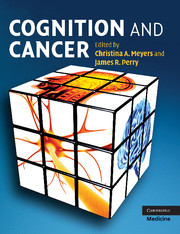Book contents
- Frontmatter
- Contents
- List of contributors
- Preface
- Section 1 Cognition and the brain: measurement, tools, and interpretation
- Section 2 Effects of cancer and cancer treatment on cognition
- Section 3 Interventions and implications for clinical trials
- 20 Behavioral strategies and rehabilitation
- 21 Support services
- 22 Pharmacological interventions for the treatment of radiation-induced brain injury
- 23 Neurocognitive testing in clinical trials
- Index
- Plate section
- References
22 - Pharmacological interventions for the treatment of radiation-induced brain injury
Published online by Cambridge University Press: 13 August 2009
- Frontmatter
- Contents
- List of contributors
- Preface
- Section 1 Cognition and the brain: measurement, tools, and interpretation
- Section 2 Effects of cancer and cancer treatment on cognition
- Section 3 Interventions and implications for clinical trials
- 20 Behavioral strategies and rehabilitation
- 21 Support services
- 22 Pharmacological interventions for the treatment of radiation-induced brain injury
- 23 Neurocognitive testing in clinical trials
- Index
- Plate section
- References
Summary
Introduction
Neoplasms of the central nervous system (CNS) are a pathologically diverse group of benign and malignant tumors for which a variety of management strategies, including observation, surgery, radiation therapy (RT), and/or chemotherapy, are employed. Shown in Table 22.1 are the primary and metastatic brain tumors treated with RT, and the usual radiation doses employed for each (Shaw, 2000). Regardless of the type of brain tumor treated, radiation-treated patients will experience acute side-effects of therapy and be at risk for late sequelae. Chapter 7 outlined the biological basis of radiation-induced CNS injury. This chapter will focus on the treatment and prevention of radiation-induced brain injury, with an emphasis on pharmacological therapies.
Symptoms and Symptom Clusters in Brain Tumor Patients
The symptoms of primary and metastatic brain tumors are dependent on tumor location (Table 22.2) (Shaw, 2000). Besides location-dependent symptoms, patients with brain tumors may experience symptoms related to their physical, emotional, and cognitive functions. Often, these symptoms occur in clusters. In newly diagnosed brain tumor patients, two symptom clusters typically occur: a mood cluster including anxiety, depression, and sadness, and an expressive language cluster including difficulty reading, writing, and finding the right words (Gleason et al., 2006). In long-term survivors, three symptom clusters are more common, including a physical function cluster (decreased energy, fatigue, and frustration), mood cluster (anger, anxiety, confusion, and depression), and a cognition cluster (difficulty concentrating, reading, remembering, and finding the right words) (Saconn et al., 2006).
- Type
- Chapter
- Information
- Cognition and Cancer , pp. 312 - 319Publisher: Cambridge University PressPrint publication year: 2008

